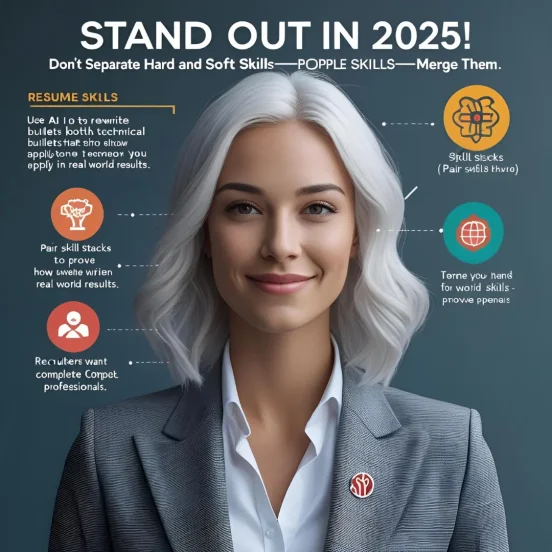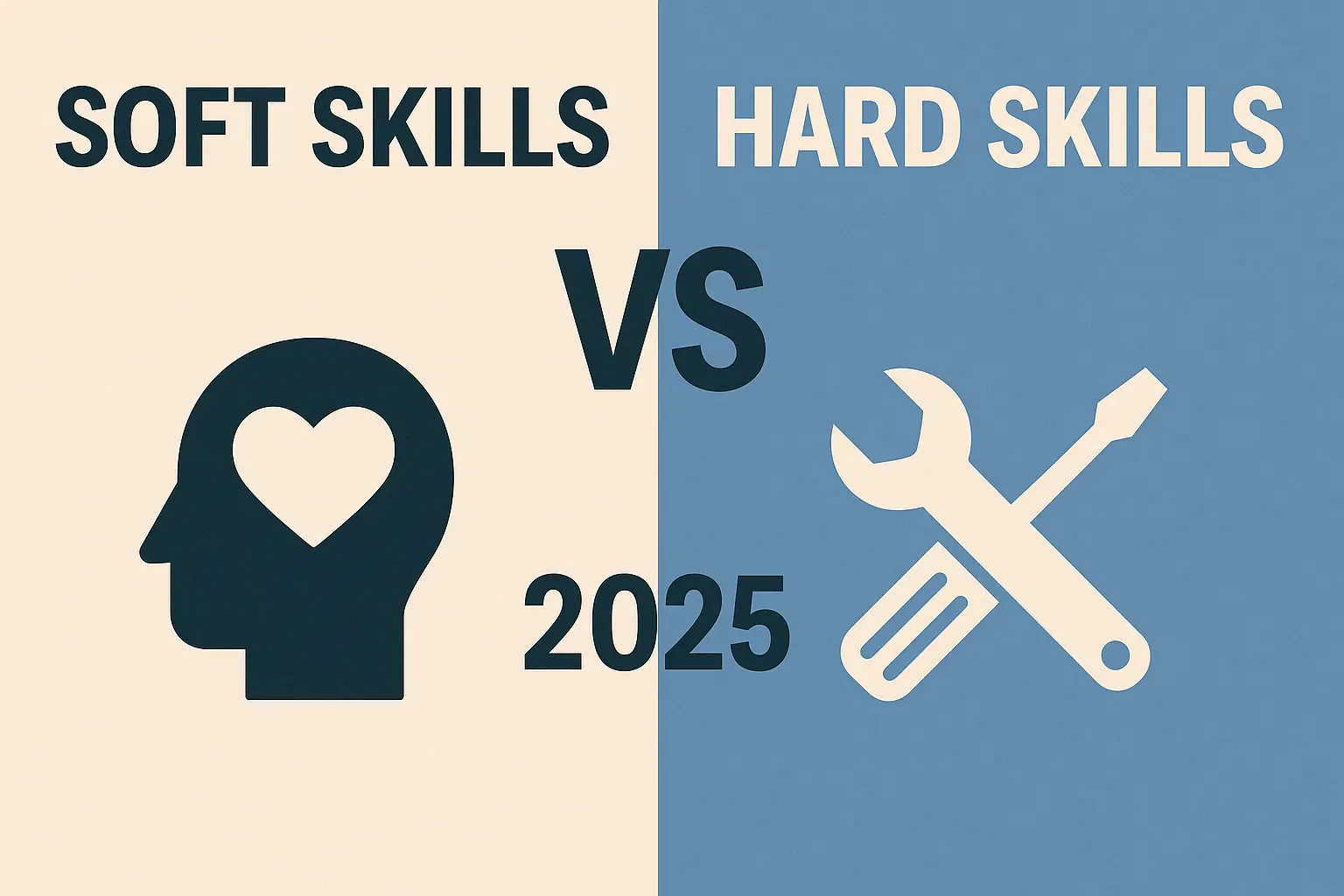Introduction
Soft Skills vs Hard Skills 2025 is the debate shaping the future of work. Artificial intelligence, automation, and globalization are rewriting job descriptions at lightning speed. In this new landscape, one question dominates every job seeker’s mind: what matters more to hiring managers in 2025 — soft skills or hard skills?
The truth is that the debate between soft skills and hard skills in 2025 has evolved. Employers are no longer choosing one over the other. Instead, they’re searching for candidates who can demonstrate both — and, more importantly, show how the two work together.
This article breaks down the differences, highlights what’s in demand for 2025, and shares practical hacks for showcasing your skills in a way that makes hiring managers take notice.
What Are Hard Skills? (And Why They Still Matter)
Hard skills are the technical, measurable abilities you learn through education, training, or on-the-job experience. They are often the first things employers scan for on a résumé because they can be tested, quantified, and compared directly between candidates.
In 2025, the most in-demand hard skills include:
- Artificial Intelligence (AI) and Machine Learning (ML): As more companies adopt AI-powered tools, knowledge of prompt engineering, model training, and AI integration is becoming highly valued.
- Data Analysis and Data Literacy: Organizations run on data, and employees who can extract insights and make data-driven decisions are indispensable.
- Cybersecurity: With cyberattacks on the rise, professionals who can secure systems and protect sensitive data remain in high demand.
- Cloud Computing: From AWS to Azure, cloud platforms power modern business infrastructure.
- Project Management: Certifications like PMP or Agile Scrum are still strong career assets.
Hard skills are essential because they get your foot in the door. Without them, your résumé might not even pass through Applicant Tracking Systems (ATS). But by themselves, hard skills are no longer enough to land the job.
Put Your Hard Skills to Work
Search WhatJobs for roles that need expertise in AI, data analysis, cybersecurity, cloud computing, and project management—skills that employers are actively hiring for in 2025.
Search Jobs Now →What Are Soft Skills? (And Why They’re Rising in Value)
Soft skills are the interpersonal, behavioral, and transferable abilities that define how you work with others. Unlike hard skills, they can’t always be measured with a test or a certificate. But according to the World Economic Forum’s Future of Jobs Report 2025, they are often the deciding factor in who gets hired and who gets promoted.
In-demand soft skills for 2025 include:
- Communication: Explaining complex ideas clearly across teams.
- Problem-Solving: Tackling challenges with creativity and resourcefulness.
- Adaptability: Thriving in uncertain, fast-changing environments.
- Leadership: Inspiring, motivating, and guiding others.
- Resilience: Bouncing back from setbacks and stress.
Soft skills matter because businesses now operate in collaborative, cross-cultural, and AI-augmented workplaces. While machines may automate technical tasks, it’s humans who bring empathy, leadership, and critical thinking — qualities no algorithm can replicate.
Soft Skills vs Hard Skills: Key Differences
While both skill types are essential, they play different roles in your career journey:
| Category | Hard Skills | Soft Skills |
|---|---|---|
| Definition | Technical, teachable abilities | Interpersonal, behavioral abilities |
| How to Learn | Courses, certifications, training | Practice, feedback, real-world experience |
| Measured By | Tests, portfolios, software proficiency | Feedback, teamwork success, leadership outcomes |
| Example | Coding in Python, Data Analysis, Cloud Management | Communication, Problem-Solving, Leadership |
| Employer Value | Prove job competence | Prove cultural fit & growth potential |
In 2025, employers are no longer asking “soft vs hard skills — which one?” Instead, they’re asking: “How does this candidate demonstrate both?”
What Hiring Managers Really Want in 2025
Surveys consistently show that soft skills tip the balance when technical skills are equal. A recent LinkedIn hiring trends report revealed that 89% of hiring managers believe soft skills are just as important — or more important — than hard skills when making final decisions.
Why? Because technology is changing fast. A coding language or cloud platform you learn today could be obsolete in three years. But adaptability, resilience, and communication are timeless. Employers in 2025 know that the best hires are those who can learn new hard skills quickly while bringing strong human skills to the table.
In other words, the future belongs to hybrid professionals: candidates who can combine technical competence with human-centered strengths.
How to Stand Out in 2025
Here’s where most job seekers fail: they list hard skills in one section of their résumé and soft skills in another, without showing how the two actually work together. To truly stand out in 2025, you need strategies that merge, balance, and highlight both.
🔧 Hack #1: Use AI to Highlight Your Skills
Artificial intelligence is no longer just a buzzword — it’s a career hack for job seekers. You can use AI tools like ChatGPT to rewrite your résumé and work experience in ways that showcase both soft and hard skills together.
Example:
- Basic résumé bullet: “Managed a team of five developers.”
- AI-enhanced version: “Led a cross-functional team of five developers, improving collaboration and reducing project delays by 20%.”
See the difference? The second version highlights not just management (hard skill) but also leadership and communication (soft skills).
AI-powered résumé builders also help optimize for ATS systems, making sure your hard skills get picked up by recruiters while your soft skills shine in human review.
🔧 Hack #2: Pair Your Skills for Maximum Impact (Skill Stacks)
Another powerful technique is to pair hard and soft skills together into what recruiters call “skill stacks.” Instead of listing skills in isolation, combine them to show how they work in real-world scenarios.
Here are some examples:
| Hard Skill | Soft Skill | Career Boost Example |
|---|---|---|
| Data Analysis | Communication | Turns raw data into clear business insights |
| Cybersecurity | Problem-Solving | Adapts quickly to new security threats |
| Project Mgmt | Leadership | Delivers complex projects on time with engaged teams |
| AI/ML Tools | Adaptability | Rapidly learns and integrates new AI systems |
| Cloud Computing | Collaboration | Builds cross-team solutions for global operations |
This approach demonstrates that you’re not just a list of skills — you’re someone who applies them effectively. Recruiters love it because it mirrors the way they evaluate candidates: not in silos, but as complete professionals.

Quick Ways to Build Both Skill Types
The good news? You don’t need years to improve your skills. In 2025, there are faster routes to leveling up.
Hard Skills:
- Take 90-day certification programs (Google Certificates, Coursera, LinkedIn Learning).
- Join coding bootcamps or cybersecurity crash courses.
- Practice data analysis with free datasets online.
Soft Skills:
- Join Toastmasters to improve communication.
- Volunteer in leadership roles (community groups, online teams).
- Use reflection tools and journaling to track adaptability and resilience growth.
Even dedicating one hour a week can compound into noticeable improvement within months.
Why Balancing Both Skills Future-Proofs Your Career
The coming years will see even more automation of hard skills. AI will code, analyze, and even design at a level humans can’t match. But that doesn’t mean hard skills lose their value. Instead, it means the real differentiator is how you combine them with soft skills.
Imagine two candidates:
- Candidate A knows Python, SQL, and AWS.
- Candidate B knows the same, but also demonstrates leadership, adaptability, and collaboration.
Who gets hired? In 2025, it’s almost always Candidate B.
By balancing both skill sets, you’re not just employable now — you’re future-proof.
FAQs
Q1. What are the top 5 hard skills in 2025?
AI/ML, Data Analysis, Cybersecurity, Cloud Computing, and Project Management.
Q2. What are the top 5 soft skills in 2025?
Communication, Problem-Solving, Adaptability, Leadership, and Resilience.
Q3. Which is more important — soft skills or hard skills in 2025?
Both matter, but surveys show soft skills are the differentiator when candidates have equal technical ability.
Q4. How can I improve both quickly?
Take online certifications for hard skills; practice communication and leadership in real-world projects for soft skills.
Q5. What’s the best résumé strategy?
Use AI to enhance your bullet points and pair skills into skill stacks that demonstrate impact.
Conclusion
The debate between soft skills vs hard skills in 2025 is no longer a matter of choosing one over the other. Hiring managers expect both. The difference comes down to how well you can demonstrate, combine, and communicate your skills.
Use AI tools to enhance your résumé. Pair hard and soft skills into meaningful skill stacks. Keep developing both with quick, consistent learning.
In the end, the most valuable professionals in 2025 are those who prove they are technically capable and humanly adaptable. That’s the winning formula that will future-proof your career.




